
The Starlost is a Canadian-produced science fiction television series created by writer Harlan Ellison and broadcast in 1973 on CTV in Canada and syndicated to local stations in the United States. The show's setting is a huge generational colony spacecraft called Earthship Ark, which following an unspecified accident has gone off course. Centuries after its original launch however, most of the descendants of the original crew and colonists are unaware that they are even aboard a spaceship. The series experienced a number of production difficulties, and Ellison broke with the project before the airing of its first episode.
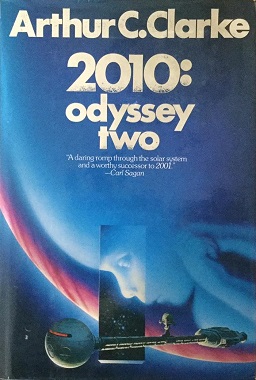
2010: Odyssey Two is a 1982 science fiction novel by British writer Arthur C. Clarke. It is the sequel to his 1968 novel 2001: A Space Odyssey, though Clarke changed some elements of the story to align with the film version of 2001.

Gordon Rupert Dickson was a Canadian-American science fiction writer. He was inducted into the Science Fiction and Fantasy Hall of Fame in 2000.
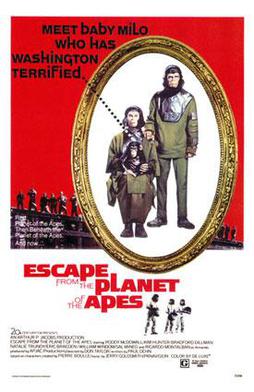
Escape from the Planet of the Apes is a 1971 American science fiction film directed by Don Taylor and written by Paul Dehn. The film is the sequel to Beneath the Planet of the Apes (1970) and the third installment in the Planet of the Apes original film series. It stars Roddy McDowall, Kim Hunter, Bradford Dillman, Natalie Trundy, Eric Braeden, Sal Mineo, and Ricardo Montalbán. In the film, Cornelius (McDowall) and Zira (Hunter) flee back through time to 20th-century Los Angeles, where they face fear and persecution.

Military science fiction is a subgenre of science fiction that depicts the use of science fiction technology, including spaceships and weapons, for military purposes and usually principal characters who are members of a military organization, usually during a war; occurring sometimes in outer space or on a different planet or planets. It exists in a range of media, including literature, comics, film, television and video games.
The Childe Cycle is an unfinished series of science fiction novels by Canadian writer Gordon R. Dickson. The name Childe Cycle is an allusion to "Childe Roland to the Dark Tower Came", a poem by Robert Browning, which provided inspiration for elements in the work. The series is sometimes referred to as the Dorsai series, after the Dorsai people who are central to it. The related short stories and novellas all center on the Dorsai, primarily members of the Graeme and Morgan families.

Soldier, Ask Not is a science fiction novel by American writer Gordon R. Dickson, published in 1967 by Dell Publishing company. It is also the title of a novella which appeared in the October, 1964 issue of Galaxy Science Fiction magazine. The shorter work constitutes about one third of the novel.

The First Men in the Moon is a scientific romance, originally serialised in The Strand Magazine and The Cosmopolitan from November 1900 to June 1901 and published in hardcover in 1901, by the English author H. G. Wells, who called it one of his "fantastic stories". The novel tells the story of a journey to the Moon undertaken by the two protagonists: a businessman narrator, Mr. Bedford; and an eccentric scientist, Mr. Cavor. Bedford and Cavor discover that the Moon is inhabited by a sophisticated extraterrestrial civilisation of insect-like creatures they call "Selenites". The inspiration seems to come from the famous 1865 book by Jules Verne, From the Earth to the Moon, and the opera by Jacques Offenbach from 1875. Verne's novel also uses the word "Selenites" to describe inhabitants of the Moon.
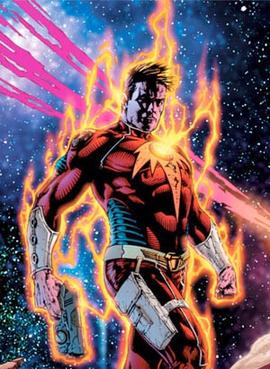
Captain Comet is a superhero appearing in American Comic Books published by DC Comics, created by editor Julius Schwartz, writer John Broome, and artist Carmine Infantino.
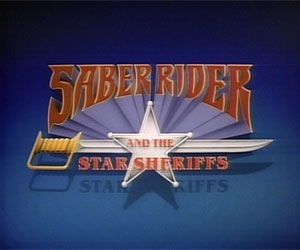
Saber Rider and the Star Sheriffs is an animated television space Western, similar to the series The Adventures of the Galaxy Rangers and BraveStarr. The series premiered in the United States in 1987 and had a run of 52 episodes.

JLA: Pain of the Gods is a trade paperback which compiles issues #101-106 of the American comic book JLA, published by DC Comics. This story arc was written by Chuck Austen and penciled by Ron Garney.

Tactics of Mistake is a science fiction novel by American writer Gordon R. Dickson, first published as a serial in Analog in 1970-1971. It is part of Dickson's Childe Cycle series, in which mankind has reached the stars and divided into specialized splinter groups. The fourth book written, it is chronologically the second book of the cycle, occurring roughly a century after Necromancer, and a century before Dorsai!. The primary character, Cletus Grahame, is the ancestor of the key characters in later works: the twins, Ian and Kensie Graeme, and their nephew, Donal Graeme.
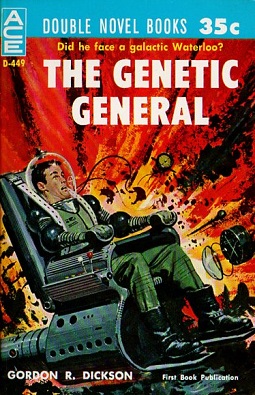
Dorsai! is the first published book of the incomplete Childe Cycle series of science fiction novels by American writer Gordon R. Dickson. Later books are set both before and after the events in Dorsai!.
The Legion of Space is a space opera science fiction series by American writer Jack Williamson. The story takes place in an era when humans have colonized the Solar System but dare not go farther, as the first extra-solar expedition to Barnard's Star failed and the survivors came back as babbling, grotesque, diseased madmen. They spoke of a gigantic planet, populated by ferocious animals and the single city left of the evil "Medusae". The Medusae bear a vague resemblance to jellyfish, but are actually elephant-sized, four-eyed, flying beings with hundreds of tentacles. The Medusae cannot speak, and communicate with one another via a microwave code.

Protostar: War on the Frontier is a 1993 science fiction video game produced by Tsunami Media that blends elements of role-playing, space exploration, space combat, and strategy. The player commands a spaceship from a first-person perspective in real-time capable of traveling to the various planets in the game world and launching an explorer vessel to traverse their surfaces. Several sentient alien races inhabit the region with whom the player interacts through friendly conversation, intense spaceship combat, or barter at their planetary trading posts. One of these races, the Skeetch, is aggressively threatening to conquer the Earth; the player has been recruited to convince the other sentient races in the region to join humanity in an alliance against the Skeetch. A secondary goal of the game is to earn money by performing actions such as selling alien lifeforms and minerals collected on planetary surfaces to obtain the funds needed to upgrade the player's spaceship and improve the odds of survival in confrontations with the Skeetch and other hostile entities. Computer Gaming World criticized the game for failing to break new ground and for its "muddled" blend of science fiction themes, but did recommend it to players new to this genre.

Necromancer is a science fiction novel by American writer Gordon R. Dickson, published in 1962. It was alternatively titled No Room for Man between 1963 and 1974 before reverting to its original title. It is the prequel to Dickson's earlier novel Dorsai!.
Isaac's Universe is a fictional universe created by Isaac Asimov for other science fiction writers to use as a setting. It introduces the collaborative science fiction universe created by Asimov which eventually resulted in five volumes: three short story collections and two novels. It was initiated by Martin H. Greenberg, who also edited and published its three short stories collection by Avon Books starting in 1990.
Rocket-Bye Baby is a 1956 Warner Bros. animated cartoon in the Merrie Melodies series, directed by Chuck Jones. The short was released on August 4, 1956.
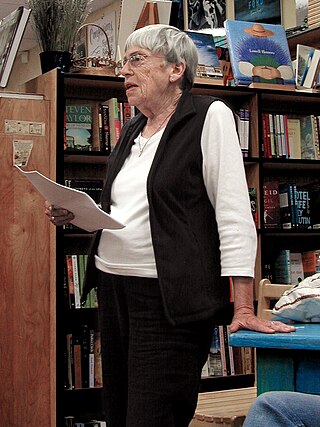
Soft science fiction, or soft SF, is a category of science fiction with two different definitions, defined in contrast to hard science fiction. It can refer to science fiction that explores the "soft" sciences, as opposed to hard science fiction, which explores the "hard" sciences. It can also refer to science fiction which prioritizes human emotions over the scientific accuracy or plausibility of hard science fiction.

The Final Encyclopedia is a science fiction book by Gordon R. Dickson published in 1984. It is part of the Childe Cycle series. The Final Encyclopedia transitions from the militaristic action-adventure of the earlier books in the Childe Cycle to a philosophical commentary on the evolution of humankind.














